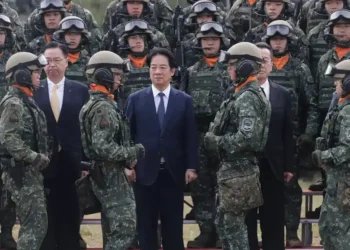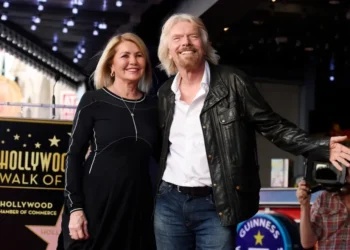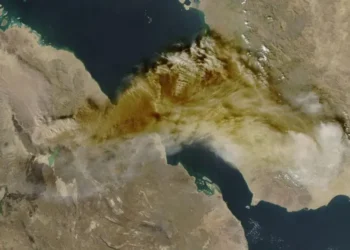Ahmad al-Sharaa’s Washington Visit Marks Historic Turn in U.S.–Syria Relations
Syrian President Ahmad al-Sharaa arrived in Washington this weekend, becoming the first Syrian head of state to visit the White House since the country’s independence nearly eight decades ago. Once detained by U.S. forces in Iraq for fighting alongside al-Qaida militants, al-Sharaa now seeks to rebuild Syria’s international standing, lift long-standing sanctions, and formalize his country’s role in the U.S.-led coalition against the Islamic State group.
A Former Militant Turned Diplomat
Two decades ago, few imagined that Ahmad al-Sharaa — once known as Abu Mohammed al-Golani — would become Syria’s president, let alone a White House guest. Detained by U.S. forces in Iraq during the early 2000s for his involvement with al-Qaida, al-Sharaa later renounced extremism, broke with the group, and built an armed movement that eventually challenged the government of Bashar Assad.
After leading rebel forces to victory and ousting Assad in December last year, al-Sharaa launched a diplomatic campaign to restore Syria’s global legitimacy. His government has since secured renewed engagement from regional and Western powers, positioning itself as a potential stabilizing force after more than a decade of civil war.
Building a New Relationship With Washington
Al-Sharaa’s meeting with U.S. President Donald Trump on Monday follows an earlier encounter in Saudi Arabia in May, where Trump announced the lifting of decades-old sanctions. According to Syrian state media, al-Sharaa arrived in the United States on Saturday to prepare for discussions focused on Syria’s economic recovery, counterterrorism efforts, and regional stability.
The centerpiece of his agenda is the repeal of the Caesar Act, a U.S. law that imposed sweeping economic sanctions on Syria in response to human rights abuses under Assad’s government. Although the sanctions are currently suspended by presidential order, their permanent repeal requires congressional approval.
In a statement, Syria’s Ministry of Information said al-Sharaa will stress “the importance of lifting economic sanctions, particularly the Caesar Act, to allow for Syria’s economic recovery and investment growth,” while reaffirming Syria’s commitment to “continuing the fight against terrorism and promoting regional security.”
Trump Administration Moves Toward Sanctions Relief
Days ahead of al-Sharaa’s arrival, President Trump confirmed that he had initiated steps to permanently lift U.S. sanctions on Syria. “It’s a tough neighborhood and he’s a tough guy, but I got along with him very well, and a lot of progress has been made with Syria,” Trump said, describing al-Sharaa’s leadership as “a chance for stability.”
On Thursday, the United Nations Security Council voted to remove sanctions against al-Sharaa and his interior minister. The U.S. government subsequently took both officials off its “specially designated global terrorist” list — a symbolic but significant shift in policy.
Meanwhile, lawmakers in Washington are debating a broader legislative repeal of the Caesar Act through the annual defense authorization bill. The measure has advanced in the Senate but faces resistance in the House, where key Republicans have demanded conditions before a full repeal.
Political Resistance and Minority Concerns
Rep. Brian Mast, chair of the House Foreign Affairs Committee, and Sen. Lindsey Graham, a senior Republican ally of Trump, have both expressed caution over lifting sanctions entirely. They argue that any repeal should include guarantees for religious and ethnic minorities, the removal of foreign fighters from Syria’s institutions, and the maintenance of peaceful relations with Israel.
Human rights advocates have raised additional concerns about continuing sectarian violence in Syria. Over the past year, clashes involving pro-government Sunni militias have led to hundreds of deaths among Alawite and Druze communities. Al-Sharaa has promised accountability, but many minorities remain skeptical of his government’s ability — or willingness — to deliver justice.
The U.S.-based advocacy group Save the Persecuted Christians sent a letter signed by over 100 religious leaders urging Trump to press al-Sharaa to protect minority groups and open humanitarian corridors, including one from the Israeli-controlled Golan Heights to the Druze enclave of Sweida in southern Syria.
Regional Shifts and Emerging Security Dynamics
Since the fall of the Assad regime, the Middle East’s geopolitical map has begun to shift. Israel has expanded control over a formerly U.N.-patrolled buffer zone in southern Syria, while informal talks between the two countries have explored the possibility of a demilitarized zone south of Damascus.
Although Israel and Syria lack diplomatic relations, both governments have engaged in indirect negotiations, according to regional officials. Analysts view these talks as part of a broader effort to stabilize post-war Syria and reduce Iranian and Hezbollah influence in the region.
Sen. Jeanne Shaheen, the top Democrat on the Senate Foreign Relations Committee, has supported the effort to repeal the Caesar Act, calling it “a unique opportunity to reset regional relations in ways not seen in decades.”
Balancing Recovery and Accountability
Supporters of sanctions repeal argue that measures targeting Assad’s regime are no longer justified under Syria’s new leadership. They warn that keeping the Caesar Act in place discourages global companies from investing in reconstruction and humanitarian projects.
Mouaz Moustafa, executive director of the Syrian Emergency Task Force, said the U.S. should focus on targeted measures rather than broad sanctions. “To use Caesar for that is like using a sledgehammer instead of a scalpel — you’re going to kill the person you’re operating on,” he said.
Toward a Renewed Anti-IS Coalition
Another major item on al-Sharaa’s Washington agenda is Syria’s formal entry into the U.S.-led coalition against the Islamic State group (IS). Although Syrian forces have long battled IS cells, their integration into the 80-member coalition marks a symbolic milestone, according to U.S. envoy Tom Barrack.
A Trump administration official confirmed that al-Sharaa is expected to sign the coalition agreement during his visit, though White House press secretary Karoline Leavitt declined to comment publicly.
U.S. officials say the move will enhance intelligence sharing and operational coordination between Syrian and American forces. While IS no longer controls territory in Syria or Iraq, sporadic attacks persist. According to U.S. Central Command, there have been 311 IS attacks in Syria and 64 in Iraq so far this year, compared with 878 and 160, respectively, in 2024.
A Fragile Domestic Balance
Before Assad’s downfall, al-Sharaa led Hayat Tahrir al-Sham (HTS), an Islamist group that controlled large parts of northwestern Syria. Though initially affiliated with al-Qaida, HTS broke away in 2016 and later fought both Islamic State and government forces.
Since taking office, al-Sharaa has sought to integrate various armed factions into a unified national army. The U.S. has pushed for the inclusion of the Kurdish-led Syrian Democratic Forces (SDF) — Washington’s primary partner in the anti-IS campaign — but unification efforts have faced setbacks due to ethnic and political tensions.
Despite intermittent clashes between SDF units and Syrian government troops, both sides have agreed in principle to merge under a national defense framework. Analysts say al-Sharaa’s cooperation with the U.S. may help advance this goal if mutual trust continues to grow.
A Defining Moment for Syria’s Return to the World Stage
As Syria reopens diplomatic channels long sealed by years of conflict, al-Sharaa’s visit to Washington signals an attempt to reshape the country’s international identity. His personal transformation — from militant to president, from U.S. detainee to White House guest — mirrors a broader national pivot toward political rehabilitation and reconstruction.
Whether the trip leads to lasting peace and prosperity remains uncertain, but for the first time in decades, Syria’s leadership is engaging the global stage not through confrontation — but negotiation.
This article was rewritten by JournosNews.com based on verified reporting from trusted sources. The content has been independently reviewed, fact-checked, and edited for accuracy, neutrality, tone, and global readability in accordance with Google News and AdSense standards.
All opinions, quotes, or statements from contributors, experts, or sourced organizations do not necessarily reflect the views of JournosNews.com. JournosNews.com maintains full editorial independence from any external funders, sponsors, or organizations.
Stay informed with JournosNews.com — your trusted source for verified global reporting and in-depth analysis. Follow us on Google News, BlueSky, and X for real-time updates.














